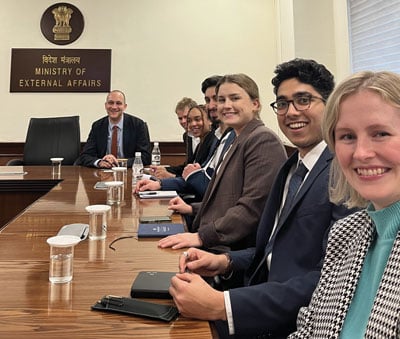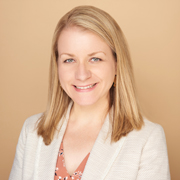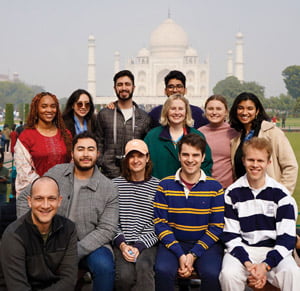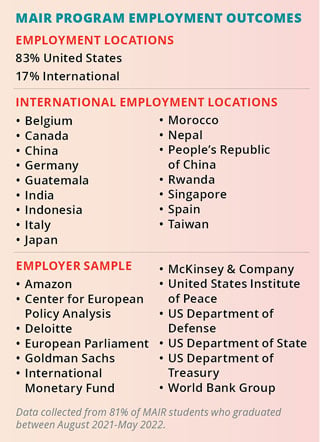Advancing a Global Affairs Career Through Graduate Education
THIS GUIDE IS NO LONGER ACTIVE. For the current FP Guide, click here.
Johns Hopkins University School of Advanced International Studies
Multidisciplinary Curriculum and Career Planning Foster Flexibility and Public-Private Sector Transitions
 Amid the ever-changing terrain of international affairs careers, Julie Nussdorfer, associate director of global careers at Johns Hopkins University School of Advanced International Studies (SAIS), has observed several transformative trends. Notably, there’s a growing demand for data analytics skills, coupled with ongoing
Amid the ever-changing terrain of international affairs careers, Julie Nussdorfer, associate director of global careers at Johns Hopkins University School of Advanced International Studies (SAIS), has observed several transformative trends. Notably, there’s a growing demand for data analytics skills, coupled with ongoing
discourse on the role of artificial intelligence—its risks and benefits—among employers.
Simultaneously, the global push for sustainability and decarbonization continues to propel SAIS students toward social-impact careers in the technology, environment, and energy spaces.
Nussdorfer underscores a trend in students’ recognition of the changing nature of career paths. In a post-COVID era, the conventional boundaries between private and public sectors are blurring, enabling students to be more flexible in leveraging their skills and knowledge across industries and sectors. “Previously, students would train to enter either private or public sectors, but now we’re seeing a lot of crossover and overlap,” she explains. “People in the public sector with knowledge of the defense and intelligence industry are transitioning into the tech industry or vice versa.”

“Students who come to SAIS aspire to tackle global issues and solve problems, and they’re discovering numerous approaches to shaping their careers and addressing the world’s challenges.” Julie Nussdorfer, Associate Director of Global Careers, School of Advanced International Studies, Johns Hopkins University
Built on life-design principles, the school’s multidisciplinary curriculum promotes curiosity, versatility, adaptability, and flexibility—indispensable traits for thriving in an evolving field and making a positive impact on the world.
 This curiosity-driven approach to education and career planning encourages students to explore a broader range of applications of their abilities and interests. Additionally, SAIS facilitates engagement through classes that integrate academic knowledge with professional skills, global career events, personalized career support and workshops, career treks, internships, and meaningful interactions with alumni and potential employers that aid students in building a varied and extensive professional network.
This curiosity-driven approach to education and career planning encourages students to explore a broader range of applications of their abilities and interests. Additionally, SAIS facilitates engagement through classes that integrate academic knowledge with professional skills, global career events, personalized career support and workshops, career treks, internships, and meaningful interactions with alumni and potential employers that aid students in building a varied and extensive professional network.
 “When students come to SAIS, they may have something in mind, but as they’re exposed to broader paths, they often uncover new career options that were not within their initial purview,” says Nussdorfer. “We encourage students to listen to their curiosity and try out different things. It gives them a chance to explore and find their best fit.”
“When students come to SAIS, they may have something in mind, but as they’re exposed to broader paths, they often uncover new career options that were not within their initial purview,” says Nussdorfer. “We encourage students to listen to their curiosity and try out different things. It gives them a chance to explore and find their best fit.”
SAIS is also broadening the ways in which students can pursue their degree. The school’s catalog now includes specialized one-year master’s programs like the Master of Arts in Strategy, Cybersecurity, and Intelligence (MASCI) and the Master of International Public Policy (MIPP), as well as online master’s programs focusing on sustainable energy and global risk. The school’s traditional two-year Master of Arts in International Relations (MAIR) remains versatile, allowing students to apply their knowledge and skills across diverse career paths.
Johns Hopkins University School of Advanced International Studies
https://sais.jhu.edu
[email protected]
202-663-5700![]()
Contents
- Advancing a Global Affairs Career Through Graduate Education
- Columbia University, School of International and Public Affairs
- Yale University, Jackson School of Global Affairs
- Georgetown University, School of Foreign Service
- University of Notre Dame, Keough School of Global Affairs
- The Fletcher School at Tufts University
- Johns Hopkins University School of Advanced International Studies
- Indiana University, Hamilton Lugar School of Global and International Studies
- Seton Hall University, School of Diplomacy and International Relations